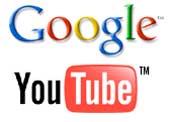Why Google Should Buy YouTube
 There’s been a lot of speculation lately about a possible Google buyout of Internet video website YouTube for US$1.6B. A lot has been said about the potential value (or lack thereof) of YouTube and its future success (or demise).
There’s been a lot of speculation lately about a possible Google buyout of Internet video website YouTube for US$1.6B. A lot has been said about the potential value (or lack thereof) of YouTube and its future success (or demise).
But why, exactly, would Google drop one-and-a-half billion dollars on YouTube? After all, Google already operates a similar service, Google Video, complete with money-making functions such as advertising and pay-per-view/download.
What value can YouTube bring to Google?
The first obvious answer is market share. According to some estimates, YouTube serves up 60% of the online video market… more than 100 million videos per day. But you’d think with $1.6B Google can boost their own market share (estimated at 10%).
Content would be the other possible answer, but I don’t think YouTube’s collection of user generated content is worth that much, even if you manage to place advertising on them.
Some people have gone as far as suggesting Google simply needs to invest some of their war chest money and somehow came upon YouTube as an acquisition target. If that’s the case, then let me suggest Google should buy lottery tickets instead.
The rest of the theories revolve around Google buying a YouTube to eliminate competition. While a valid point, Google hasn’t normally resorted to gobbling up competitors, usually preferring to buy companies offering services that complement rather than compete with Google.
So, what does Google see in YouTube?
I like to think Google is a smart company with big plans, so I analyze them with this in mind. Think Big. Think Smart.
Google wants to dominate online video distribution and with it, online video ratings. Without ratings you can’t really sell highly-profitable advertising. And without a majority of distribution market share, you can’t really accurately measure ratings.
Google is allegedly interested in competing with Nielsen in the ratings market and in collaborating with Apple on their upcoming iTV product. I’ve written previously about Google’s potential as a Universal Personal Video Recorder (Tivo on steroids). And just recently Google held a think tank with the top US media executives (YouTube was also present). Something’s definitely cooking.
YouTube offers a quick ticket to this online media distribution empire, because YouTube has the market share but, more importantly, the data.
YouTube has over a year of extensive viewership data, detailing how / where / when and what people like to watch. Make no mistake, this is VERY valuable data. In a country with an estimated 110 million television households, YouTube’s 100 million videos served daily provide a treasure trove of data, ready to be mined, analyzed and monetized.
Buying YouTube would give Google a majority share of the Internet video market, along with the important rating’s data to monetize these videos via Google Ads.
More importantly, owning a majority share of the video market would allow Google to collect and commercialize CREDIBLE ratings data, which it could then share with the major networks and content owners, distribute their videos online, and get a cut of the ad revenue.
The Copyright Issue
A favorite argument of late is that as soon as a big player buys YouTube, said player would be sued into oblivion by copyright holders. While that may hold a grain of truth, YouTube has actively policed the website for copyright violators when alerted by the rightful copyright owner. YouTube has also signed agreements with major players, such as the one recently signed by my good friend Alex Zubillaga of Warner Music, for content distribution and revenue sharing via YouTube.
I believe Google has even better relations with these major players and with credible and comprehensive ratings data to share could easily sign distribution and revenue sharing agreements with them.
The Big Picture
All of this won’t certainly come together over night. Too many loose ends need to be tied, agreements need to be made and signed, and technology needs to be put in place. But I can certainly see a road map outlining the steps ahead for Google.
1. The first stage involves the acquisition of YouTube and its integration into Google Video. Agreements with the major networks and content producers will allow the distribution of videos via Google. Most of these players already distribute their videos online for free, so a bigger potential audience combined with ratings data would certainly be appetizing.
2. Stage two would involve integration with services such as Apple’s iTV, allowing viewers to play downloaded content (along with ads) on their televisions. Google could combine viewing history with search history to further finetune the ads displayed.
3. Stage three would allow viewers to record programs on Google’s servers and watch them at a later time. Additionally Google would have the capacity to allow revenue sharing agreements with local network affiliates, according to the viewer’s geographical location.
Of course all this depends on whether Google is indeed interested in taking a shortcut by buying YouTube. And if YouTube is not yet aware of these ramifications, if I were them, I’d certainly start raising the price.
Comments are always welcome. I’d love to discuss these ideas.
UPDATE: Shortly after writing this article, Google did indeed proceed with the purchase of YouTube for US$1.65 Billion in stock… which I actually think is a bargain. Stay tuned for a post-buyout article.
2 Comments
Comments are closed.